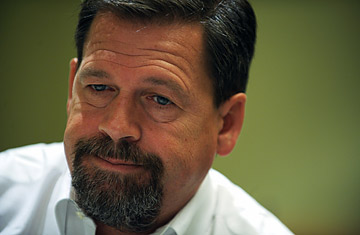
Mark Salter, top advisor to Republican presidential nominee Arizona Senator John McCain
(2 of 2)
Once the town hall stuff fell through you guys became much sharper against Obama and took a lot of grief, especially from the press, for about a lot of those attacks on Obama.
Yes we did.
They were all above board, you still think?
Absolutely. That's why I talk about the double-standard in coverage. In the beginning, McCain did not really come out swinging against Obama. Obama, from the North Carolina primary until yesterday, never gave a speech in this country in which it wasn't a full on assault on McCain's brand. We had spots making fun of McCain on computers, for owning seven houses, saying he had turned his back on Hispanics, saying that he opposed stem cell research, mischaracterizing his position on Social Security, on Medicare. Nobody got after him. There wasn't that collective gasp from the press that we got every time we took a shot at the guy. [McCain] rejected every appeal to bring [Rev. Jeremiah] Wright up. Barack Obama made a choice to sit it that church for 20 years and listen to this guy. Then why on earth shouldn't that be something for the voters to consider? He would not do it. He would not do it. But we got called racist by Karen Tumulty for a Frank Raines ad. We got called racist by AP for a Bill Ayers ad. So on top of everything, we had a thumb on the scale, on top of everything else. It wasn't right, but it was what it was.
Why do you think the press [took that approach]?
There were a lot of things. McCain was the story they had covered. He was a 2000 news story. [There was] a talented young guy. And then I think, a natural part of it, a lot of people want to [push forward] Civil Rights, something that gets America past the old racial baggage we have lugged around for so many years. They feel like this would be an historic achievement for the country. And I understand that appeal. I think McCain probably, as you can tell from his speech last night, felt part of that a little himself. And I think that required the press then to start rationalizing McCain into something he wasn't. He's an honest, honorable guy, who pressed and fought his way through the world's worst political environment. And played by rules that nobody else would have played by. And so it became what it is.
What were McCain's instructions to you last night about what to put in that speech?
Obviously, he wanted to be gracious, he wanted to recognize the historic significance I talked about. He specifically wanted to mention Obama's grandmother. He wanted some line in there saying racial injustice still has the power to wound. And he wanted to call the country to come together.
Tell me about the line where he says, the failure here was not yours it was mine.
That is the skipper of the ship that runs aground. That's what they do in the military. They take responsibility.
McCain now returns to the Senate, to the old role he had before. Do you see any change in what role he will try to play?
No, I think he will try to be useful to this country. You know, there are just more Democrats over there, and that changes the dynamics of the place. But he will go back, do his job, try to be useful for the country. He will help Obama where he can, and he will argue with Obama when he feels he has to.
Are you going to be his chief of staff?
No, there is already a chief of staff.
So what for you?
I don't know. I am going to go to Maine and try to figure that out.
